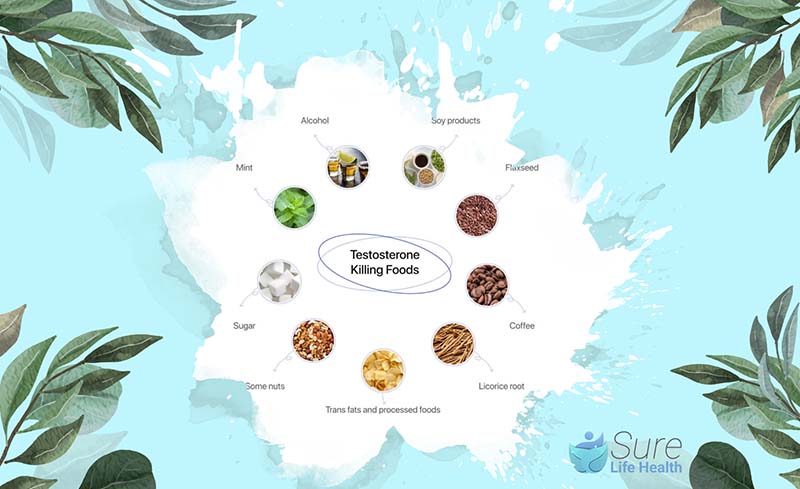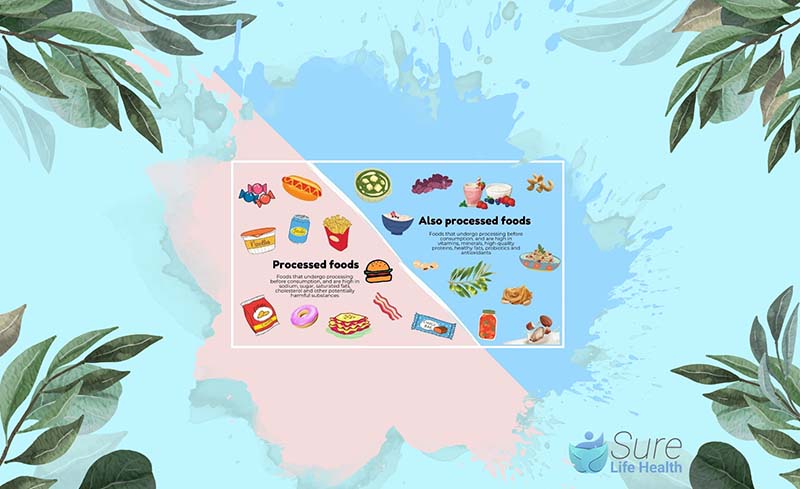Many people wonder, “What foods are testosterone killers?” as they believe certain foods like soy, dairy, and certain fats can reduce testosterone levels in the body. Research on this topic is still evolving, highlighting the need for clarity.
It’s important to recognize that our diet influences our health in multifaceted ways. Food not only energizes our cells but also has the potential to affect hormone levels, including testosterone.
In this article, we’ll explore the question of “What foods are testosterone killers?” by examining how our diet can impact testosterone levels and identifying specific foods that are suspected to play a role in this.
What Foods Kill Your Testosterone?
Vegetable Oils
Most vegetable oils are high in polyunsaturated fatty acids, which can be healthy in moderation. However, consuming excessive amounts of polyunsaturated fats has been linked to lower testosterone levels.
A study in 2019 found that diets rich in polyunsaturated fatty acids reduced testosterone production in men with hypogonadism.
Similarly, an older study from 2000 observed that frequent consumption of polyunsaturated fats was associated with significantly lower testosterone levels in Japanese men.
Baked Goods
High consumption of baked goods, especially bread and pastries, has been linked to lower testosterone levels in men, according to a study in 2018.
Dairy products and desserts were also associated with reduced testosterone levels, although the role of body fat in mediating this effect remains unclear.
Trans Fatty Acids
Trans fats, which are unhealthy fats banned since 2015, have been associated with various health risks, including lower testosterone levels.
Research suggests that regularly consuming trans fats from processed foods could decrease testosterone levels and sperm count. Animal studies have also indicated that high trans fat intake may impair reproductive function.
Nuts
Walnuts and almonds may increase the production of a substance called sex hormone-binding globulin (SHBG), which can lower free testosterone levels in the body.
While most studies on this topic focus on women, research suggests that consuming walnuts and almonds may elevate SHBG levels.
Flaxseed
Flaxseed, although rich in heart-healthy fats and nutrients, contains lignans that may bind to testosterone and promote its excretion from the body.
Some studies suggest that flaxseed consumption could decrease testosterone levels, particularly in populations with conditions like polycystic ovary syndrome (PCOS).
Alcohol
Excessive alcohol consumption can disrupt healthy testosterone levels by affecting Leydig cell production and hormone regulation in the hypothalamus.
While moderate alcohol consumption may not have a significant impact, excessive intake can lead to reduced testosterone levels and other health issues.
Peppermint and Spearmint
Research suggests that peppermint and spearmint may lower testosterone levels, although most studies have been conducted on animals. More research is needed to determine the effects on humans.
Soy
Soy foods contain phytoestrogens, which are similar to estrogen in the body.
While some studies have suggested a potential link between soy consumption and altered hormone levels, recent meta-analyses have found no significant effect of soy or phytoestrogens on testosterone levels.
Licorice Root
Studies indicate that licorice root may reduce testosterone levels, particularly in women. More research is needed to understand its effects on both sexes.
Sugar
High sugar consumption has been associated with lower testosterone levels, particularly in men with polycystic ovary syndrome (PCOS). Additionally, sugary beverages and high-calorie, high-sugar diets have been linked to decreased testosterone levels in men.
Dairy
Dairy products from pregnant cows contain elevated levels of estrogen and progesterone, which may suppress gonadotropin-releasing hormone (GnRH) in men, leading to lower testosterone levels. Consider moderating dairy intake if concerned about testosterone levels.

Other Things Kill Testosterone
In addition to the mentioned foods, it’s important to be aware of other factors that can contribute to a drop in testosterone:
- Processed Foods: While it’s tempting to indulge in processed and fried foods occasionally, they often contain high amounts of fat and sugar, which can lead to inflammation, insulin resistance, and obesity. These factors are linked to decreased testosterone levels.

- Fried Foods: Fried foods such as French fries and fried chicken are rich in unhealthy fats, which can elevate cholesterol levels and promote inflammation. This can disrupt hormone function, including testosterone production.

- Excess Caffeine: Consuming excessive caffeine can stimulate the release of cortisol, a stress hormone produced by the adrenal glands. Elevated cortisol levels can interfere with the normal regulation of testosterone, potentially leading to lower testosterone levels over time. It’s essential to monitor caffeine intake and manage stress levels to maintain healthy testosterone levels.

Conclusion
While consuming high amounts of certain foods, which are often questioned in discussions about ‘What foods are testosterone killers?’, may naturally lower testosterone levels, maintaining a balanced diet typically supports overall hormone health.
However, individuals with specific health conditions may experience low testosterone levels due to the consumption of foods identified as testosterone killers. In such cases, adopting a healthy lifestyle and consulting with a healthcare professional about appropriate treatment options is advisable.
Be sure to explore more insightful blogs from Sure Life Health, where we continue to shed light on the latest trends and breakthroughs in health and wellness.
Professor Gaye Cunnane, PhD, MB, FRCPI
As the Director of Health and Wellbeing at RCPI, Professor Gaye Cunnane is at the helm of initiatives aimed at enhancing the health and well-being of RCPI Trainers and Trainees. Her role extends beyond administration; she is also a respected clinical professor of rheumatology and a consultant rheumatologist at Trinity College Dublin (TCD) and St James’s Hospital. Prof. Cunnane’s medical journey began at TCD, where she graduated from medical school, and her path has been marked by both clinical and academic excellence.
After completing her basic clinical training in medicine, she embarked on PhD studies at University College Dublin and St Vincent’s University Hospital. Her research during this period was focused on prognostic markers in early inflammatory arthritis, a project that saw her collaborating with esteemed universities across Europe, including in Switzerland, The Netherlands, the UK, and Sweden.
Prof. Cunnane’s career took her to the University of California, San Francisco, where she spent three years delving into research on new treatments for lupus. Her academic prowess led her to the University of Leeds in 2001 as a senior lecturer, before returning to Ireland in 2003 to assume her current roles. She has also served as the National Specialty Director for Rheumatology training in Ireland, Programme Director for Basic Specialist Training with RCPI, and as a past President of the Irish Society for Rheumatology.
PUBLISHED ARTICLES
“Rheumatic disease differentiation using immunoglobulin G sugar printing by high-density electrophoresis”: Published in The Journal of Rheumatology, this study reflects her in-depth investigation into rheumatic diseases.
“Benefits of exercise in patients with rheumatoid arthritis: a randomized controlled trial”: This research work, highlighting the positive impact of exercise on rheumatoid arthritis, underscores Prof. Cunnane’s dedication to practical, patient-centered research.
Additionally, Prof. Cunnane has made notable contributions to the Annals of the Rheumatic Diseases, discussing early referral, diagnosis, and treatment of rheumatoid arthritis. She has also been involved in a study on the NCBI platform investigating exercise benefits in rheumatoid arthritis patients.
Professor Gaye Cunnane’s career is a testament to her commitment to improving patient outcomes in rheumatology through rigorous research, clinical excellence, and dedicated teaching. Her work continues to influence the field of rheumatology, both in Ireland and internationally.

